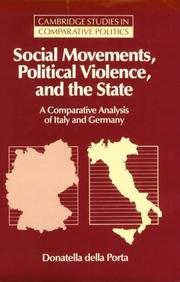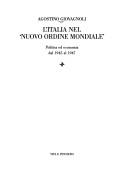| Listing 1 - 10 of 16 | << page >> |
Sort by
|
Book
Year: 2019 Publisher: Baden-Baden Nomos Verlagsgesellschaft mbH & Co. KG
Abstract | Keywords | Export | Availability | Bookmark
 Loading...
Loading...Choose an application
- Reference Manager
- EndNote
- RefWorks (Direct export to RefWorks)
Politician Aldo Moro was abducted and killed in 1978 by the terrorist organization Red Brigades. The media then stylized Moro as a «state martyr». The volume deals with the highly topical question concerning the performativity of this concept in the tension between democratic state and terrorism and reconstructs a crucial phase of post-war time policy in Italy on the basis of media sources on the Moro case. What performs a term from Christian antiquity within modern socio-political discourses? What changes has the term "martyr" undergone in European religious and cultural history? On the basis of these questions, the study opens up an interdisciplinary theoretical horizon to understand the role of religious motives in socio-political con-texts. It brings a central new dimension to the secularization debate, which sees secularization as a new configuration of politics and religion.
Christian martyrs --- Political violence --- Political aspects. --- Religious aspects. --- Moro, Aldo, --- Assassination. --- Kidnapping. --- 1945-1976 --- Italy --- Politics and government --- Religion --- Politics --- Media --- Martyrdom --- Secularization --- Representation --- Performativity --- Aldo Moro
Book
ISBN: 2721001167 9782721001160 Year: 1978 Publisher: Paris: Ed. des femmes,
Abstract | Keywords | Export | Availability | Bookmark
 Loading...
Loading...Choose an application
- Reference Manager
- EndNote
- RefWorks (Direct export to RefWorks)
Feminism --- Women in politics --- Féminisme --- Italy --- Italie --- Politics and government --- Politique et gouvernement --- Women --- Féminisme --- Political activity --- Politics --- Political parties --- Feminism - Italy. --- Women in politics - Italy. --- Italy - Politics and government - 1945-1976. --- Elections --- Book
Book
ISBN: 2707110981 9782707110985 Year: 1979 Publisher: Paris: Maspero,
Abstract | Keywords | Export | Availability | Bookmark
 Loading...
Loading...Choose an application
- Reference Manager
- EndNote
- RefWorks (Direct export to RefWorks)
Communism --- Economic history --- Italy --- Politics and government --- 316.323.73 --- Communisme. Klassenloze maatschappij --- 316.323.73 Communisme. Klassenloze maatschappij --- Economic history - 1945 --- -Italy - Politics and government - 1945-1976 --- Italy - Politics and government - 1976-1994
Book
ISBN: 9783631605790 363160579X Year: 2012 Volume: 28 Publisher: Frankfurt am Main: Lang,
Abstract | Keywords | Export | Availability | Bookmark
 Loading...
Loading...Choose an application
- Reference Manager
- EndNote
- RefWorks (Direct export to RefWorks)
Through a detailed reconstruction of American rearmament programs to Italy from the birth of NATO through the implementation of multilateral military assistance during the early 1950s, this research challenges the idea that the end of reconstruction marked a striking American shift from economic aid to defense policies. The case study of Italy highlights the impact that the defense procurement contracts had both on monetary stability and balance of payments, as well as the integration of the Italian products within the infant European trade area. This monograph demonstrates that through military assistance the United States promoted balance of payments equilibrium and expansionary domestic aggregate demand to lay down the foundation of a mass consumption market. Furthermore, this work makes the point that the Italian elites resorted to Italy's industrial role as production source for NATO to both export manufactured products to the West European economies and import high added value instrumental goods from the U.S. markets.
Military assistance, American --- North Atlantic Treaty Organization --- Italy --- United States --- Italie --- Economic conditions --- Defenses --- Economic aspects. --- Military relations --- Conditions économiques --- Economic aspects --- Conditions économiques --- Military assistance, American - Italy --- Italy - Economic conditions - 1945-1976 --- Italy - Defenses - Economic aspects --- Italy - Military relations - United States --- United States - Military relations - Italy
Book
ISBN: 2130363253 9782130363255 Year: 1980 Publisher: Paris: PUF,
Abstract | Keywords | Export | Availability | Bookmark
 Loading...
Loading...Choose an application
- Reference Manager
- EndNote
- RefWorks (Direct export to RefWorks)
Communism --- Communisme --- Italy --- Italie --- Politics and government --- Politique et gouvernement --- --Partis --- --Parti communiste --- --Communisme --- --Pouvoir --- 316.334.3 --- #SBIB:321H60 --- Politieke sociologie --- Westerse politieke en sociale theorieën vanaf de 19e eeuw: socialisme, marxisme, communisme, anarchisme --- 316.334.3 Politieke sociologie --- Partis --- Parti communiste --- Pouvoir --- Communisme - Italie --- Italie - Politique et gouvernement - 1945-1976 --- Italie - Politique et gouvernement - 1976-1994
Book
ISBN: 9462701083 9789462701083 9789461662224 946166222X Year: 2017 Volume: 20 Publisher: Leuven, Belgium : Leuven University Press,
Abstract | Keywords | Export | Availability | Bookmark
 Loading...
Loading...Choose an application
- Reference Manager
- EndNote
- RefWorks (Direct export to RefWorks)
After decades of a problematic, if not plainly hostile, approach to modernity by Catholic culture, the 1960s marked the beginning of a new era. As the Church employed a more positive approach to the world, voices in the Catholic milieu embraced a radical perspective, channeling the need for social justice for the poor and the oppressed. The alternative and complementary world views of 'universalism' and 'liberation' would drive the engagement of Catholics for generations to come, shaping the idea of international community in Catholic culture. Because of its traditional connection with the papacy and because of its prominent role in the map of European progressive Catholicism, Italy stands out as an ideal case study to follow these dynamics. By locating the Italian scenario in a broader geographical frame, Universalism and Liberation offers a new vantage point from which to investigate the social and political relevance of religion in an age of crisis.
C8 --- KADOC - Documentatie- en Onderzoekscentrum voor Religie, Cultuur en Samenleving (1977-) --- Ideologie en politiek --- C1 --- Kerken en religie --- Italië --- katholieke zuil --- 27 <45> "19" --- 27 <45> "19" Histoire de l'Eglise--Italië--20e eeuw. Periode 1900-1999 --- 27 <45> "19" Kerkgeschiedenis--Italië--20e eeuw. Periode 1900-1999 --- Histoire de l'Eglise--Italië--20e eeuw. Periode 1900-1999 --- Kerkgeschiedenis--Italië--20e eeuw. Periode 1900-1999 --- Church and social problems --- Eglise et problèmes sociaux --- Catholic Church. --- Eglise catholique --- Italy --- Italie --- Social conditions --- Conditions sociales --- Eglise et problèmes sociaux --- Christian church history --- History of Italy --- anno 1970-1979 --- anno 1960-1969 --- Christianity and international relations --- Liberation theology --- Universalism --- Catholic Church --- Politics and government --- Christianity and social problems --- Social problems and Christianity --- Social problems and the church --- Social problems --- Catholic Church and social problems --- Christianity and international relations - Catholic Church --- Church and social problems - Catholic Church --- Church and social problems - Italy --- Italy - Social conditions - 1945-1976 --- Italy - Politics and government - 1945-1976
Book
ISBN: 883431056X 9788834310564 Year: 2003 Volume: *2 Publisher: Milano: Vita e pensiero,
Abstract | Keywords | Export | Availability | Bookmark
 Loading...
Loading...Choose an application
- Reference Manager
- EndNote
- RefWorks (Direct export to RefWorks)
Catholic press --- History --- Italy, Southern --- Italy --- Economic policy --- Politics and government --- Catholic journalism --- Press --- Press, Catholic --- Journalism, Religious --- Religious newspapers and periodicals --- Catholic Church --- Meridione (Italy) --- Mezzogiorno (Italy) --- Southern Italy --- Italy [Southern ] --- 1945 --- -Catholics --- Political activity --- Christian democracy --- Partito della democrazia cristiana --- Catholic press - Italy, Southern - History - 20th century --- Italy, Southern - Economic policy - 20th century --- Italy - Politics and government - 1945-1976 --- Eglise catholique --- Italie --- 20e siecle
Book
ISBN: 9782728309726 2728309728 Year: 2012 Volume: 469 Publisher: Rome: École française de Rome,
Abstract | Keywords | Export | Availability | Bookmark
 Loading...
Loading...Choose an application
- Reference Manager
- EndNote
- RefWorks (Direct export to RefWorks)
Labor leaders --- Communists --- Right and left (Political science) --- Dirigeants syndicaux --- Communistes --- Droite et gauche (Science politique) --- Congresses --- History --- Congrès --- Histoire --- Trentin, Bruno --- Labor movement --- Italy --- Europe --- Politics and government --- Congrès --- Congresses. --- Labor leaders - Italy - Biography - Congresses --- Communists - Italy - Biography - Congresses --- Labor movement - Italy - Congresses --- Labor movement - Europe - Congresses --- Trentin, Bruno - Congresses --- Italy - Politics and government - 1945-1976 - Congresses --- Italy - Politics and government - 1976-1994 - Congresses --- Europe - Politics and government - 1945- - Congresses

ISBN: 0521029791 9780521473965 9780511527555 9780521029797 0521473969 0511527551 0511834950 Year: 2004 Publisher: Cambridge : Cambridge university press,
Abstract | Keywords | Export | Availability | Bookmark
 Loading...
Loading...Choose an application
- Reference Manager
- EndNote
- RefWorks (Direct export to RefWorks)
This book presents empirical research on the nature and structure of political violence. While most studies of social movements focus on single - nations, Donatella della Porta uses a comparative research design to analyse movements in two countries - Italy and Germany - from the 1960s to the 1990s. Through extensive usage of official documents and in-depth interviews, della Porta is able to explain the actors' construction of external political reality. The empirical data are used to build a middle-range theory of political violence that incorporates an analysis of the interactions between social movements and the state at the macro-level, an analysis of the development of radical organizations as entrepreneurs for political violence at the meso-level, and an analysis of the construction of 'militant' identities and countercultures at the micro-level.
Social movements --- Political violence --- Mouvements sociaux --- Violence politique --- Germany --- Italy --- Allemagne --- Italie --- Politics and government --- Politique et gouvernement --- Social change --- Political systems --- Internal politics --- Politics --- Violence --- Movements, Social --- Social history --- Social psychology --- Political crimes and offenses --- Terrorism --- #SBIB:324H73 --- #SBIB:324H74 --- Politieke verandering: oppositie en minderheid, protest, politiek geweld --- Politieke verandering: sociale bewegingen --- Social Sciences --- Sociology --- Political violence - Italy --- Political violence - Germany --- Social movements - Italy --- Social movements - Germany --- Italy - Politics and government - 1945-1976 --- Italy - Politics and government - 1976-1994 --- Germany - Politics and government - 1945-1990

ISBN: 8834300882 9788834300886 Year: 2000 Volume: 17 Publisher: Milano : Vita e pensiero,
Abstract | Keywords | Export | Availability | Bookmark
 Loading...
Loading...Choose an application
- Reference Manager
- EndNote
- RefWorks (Direct export to RefWorks)
Italy --- Italie --- Politics and government --- Economic conditions --- Politique et gouvernement --- Conditions économiques --- -Politics and government --- -Italy --- Conditions économiques --- Repubblica italiana (1946- ) --- Italian Republic (1946- ) --- Włochy --- Regno d'Italia (1861-1946) --- Iṭalyah --- Italia --- Italien --- Italii︠a︡ --- Kgl. Italienische Regierung --- Königliche Italienische Regierung --- إيطاليا --- Īṭāliyā --- جمهورية الإيطالية --- Jumhūrīyah al-Īṭālīyah --- Італія --- Італьянская Рэспубліка --- Italʹi︠a︡nskai︠a︡ Rėspublika --- Италия --- Италианска република --- Italianska republika --- Ιταλία --- Ιταλική Δημοκρατία --- Italikē Dēmokratia --- 이탈리아 --- It'allia --- 이탈리아 공화국 --- It'allia Konghwaguk --- איטליה --- רפובליקה האיטלקית --- Republiḳah ha-Iṭalḳit --- Lýðveldið Ítalía --- Itālija --- Itālijas Republika --- Italijos Respublika --- Olaszország --- Olasz Köztársaság --- イタリア --- Itaria --- イタリア共和国 --- Itaria Kyōwakoku --- Italiya Respublikasi --- Италия Республикаси --- Italii︠a︡ Respublikasi --- Итальянская Республика --- Італійська Республіка --- Italiĭsʹka Respublika --- İtalya --- İtalya Cumhuriyeti --- איטאליע --- Iṭalye --- 意大利 --- Yidali --- 意大利共和国 --- Yidali Gongheguo --- Laško --- 1943-1947 --- 1945-1976 --- Italy - Politics and government - 1943-1947. --- Italy - Economic conditions - 1945-1976.
| Listing 1 - 10 of 16 | << page >> |
Sort by
|

 Search
Search Feedback
Feedback About UniCat
About UniCat  Help
Help News
News